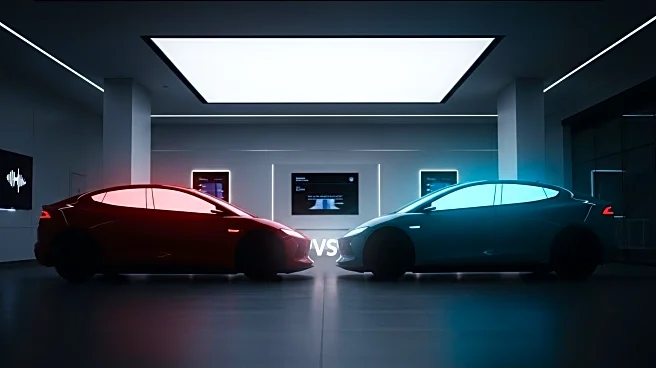What is the story about?
What's Happening?
The Chinese electric vehicle (EV) market is experiencing a severe price war that threatens the survival of many brands. This competitive environment has led to the collapse of several companies, including Ji Yue, a joint venture between Baidu and Geely. The Chinese government has historically supported the EV sector with subsidies, contributing to the country's position as the largest EV market globally. However, the intense competition has resulted in overcapacity, with more than 150 brands and over 50 EV makers vying for market share. The price wars have strained profits and led to a decline in product quality, as companies focus on cost-cutting rather than innovation.
Why It's Important?
The ongoing price war in China's EV market has significant implications for the global automotive industry. As Chinese brands like BYD, Chery, Geely, and Changan expand internationally, the competitive pressures could lead to increased exports, affecting global markets. The situation also highlights the challenges of managing overcapacity and maintaining economic stability in China, which employs millions in the auto manufacturing sector. The Chinese government's efforts to curb 'disorderly' competition reflect concerns about economic growth and social stability, as job losses could have broader societal impacts.
What's Next?
The Chinese government has introduced measures to address the price war, including summoning auto leaders to discourage price cuts and issuing guidelines to reduce overcapacity. However, experts doubt these measures will quickly resolve the issue. The price wars are expected to continue, potentially leading to further consolidation in the industry. This could result in only a few brands surviving, as predicted by industry leaders. The situation requires structural reforms to address overcapacity and ensure long-term stability in the sector.
Beyond the Headlines
The price war in China's EV market raises ethical and economic questions about the sustainability of aggressive competition strategies. The focus on cost-cutting over innovation could hinder technological advancements and reduce the overall quality of vehicles. Additionally, the potential for significant job losses poses a risk to social stability, a core concern for the Chinese government. The situation underscores the need for balanced growth strategies that prioritize both economic and social objectives.















